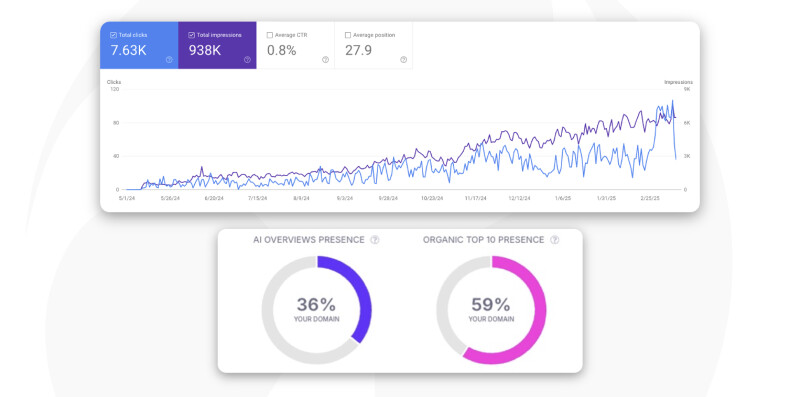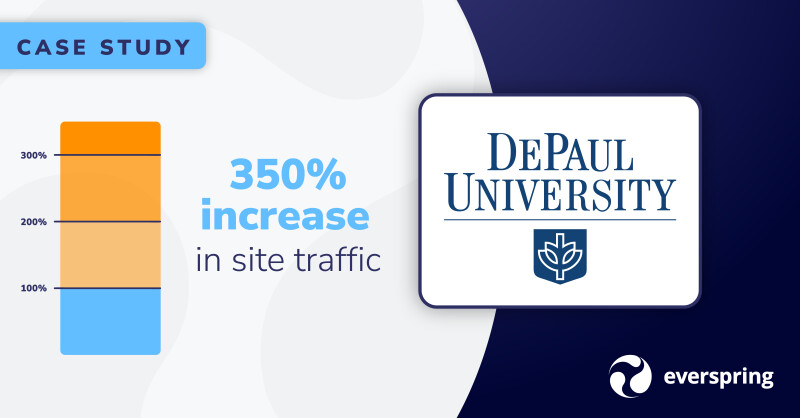THE CHALLENGE: Reaching the Right Audience
Picture this: You've got a stellar accounting program designed specifically for career-changers. It lets professionals sit for the CPA without an accounting degree. It offers real internships, amazing networking opportunities, and specialized courses in forensic and international accounting.
Yet many potential students who could benefit from it could have been discovering it more easily.
That was DePaul University's situation. Their Master of Science in Accountancy program was perfect for career-switchers, but these potential students were typing questions into search bars and often finding DePaul's competitors first.
THE REVELATION: "Stop advertising, start answering."
The breakthrough came when we stopped thinking solely about keywords and started thinking about questions.
Career-changers weren't searching for "top MSA programs." They were asking Google: "How can I become a CPA without an accounting degree?" and "What's the timeline for switching to accounting?"
DePaul had the answers. We just needed to make sure they appeared where the questions were being asked, working efficiently within their limited marketing budget.
THE ACTION: Five Moves That Changed Everything
- We mapped the actual journey of career-changers. Not some theoretical student journey—the actual, messy, question-filled path of professionals trying to figure out if accounting was their next move.
- We built content that answered real questions, not brochure copy. Instead of talking about program excellence, we explained exactly how someone with a psychology degree could become a CPA, complete with timelines and requirements.
- We structured content to perform well in both traditional search and AI. By structuring content for AI readability, we positioned DePaul to appear not just in search results but in AI overviews where 59% of their target terms now appear.
- We made the university part of the content process. DePaul reviewed, refined, and authenticated every piece of content, ensuring it truly represented their program's unique advantages.
- We built measurement around visibility where it mattered.We tracked how often DePaul appeared for high-intent questions from career-changers—the questions that led directly to applications.
THE RESULTS: Strong Organic Performance Within Budget Constraints
The strategy delivered in ways that matter:
- Increased site traffic - 350% increase in site clicks
- Consistent visibility improvements – 22% month-over-month impression growth
- Prominent placement in AI alongside search presence
- Consistent messaging across platforms
But the real result? Career-changers who need exactly what DePaul offers can now find it—without requiring extensive ad spending, which was crucial given their limited marketing budget.

THE INSIGHT: "Be the answer, not the ad."
What makes this approach so powerful is its sustainability. By becoming the answer to the specific questions career-changers are asking, DePaul built a persistent visibility engine that doesn't disappear when the ad budget runs out.
The strategy leverages a fundamental truth about search: People trust answers more than ads. By structuring their content to be the most helpful, most authoritative answer to career-changers' questions, DePaul didn't just improve their SEO—they improved their reputation.
YOUR MOVE: Three Questions to Ask Right Now
- What specific questions is your ideal audience typing into search bars? Not general category keywords—the actual, full questions they ask when trying to solve their problems.
- Are you the best answer to those questions? Not just on your website, but in search results and AI overviews where people are actually looking.
- Is your content structured for machines AND humans? Without technical implementation like schema markup, even the best content can be harder to discover.
The path DePaul took isn't magic—it's methodical. It starts with understanding the exact questions your ideal audience is asking, then becoming the best answer to those questions everywhere they're looking, especially when working with budget limitations.

